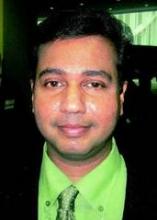SEATTLE – Adults want to know about the risk of sudden death when they are diagnosed with epilepsy, or shortly thereafter, and they want to hear the news face-to-face from their diagnosing neurologist, according to surveys of 23 epilepsy patients at McMaster University in Hamilton, Ont.
Doctors often struggle about how – or even if – to explain Sudden Unexpected Death in Epilepsy (SUDEP) to patients because the risk of SUDEP is small – perhaps 1 in 1,000 per year overall – but the potential for unwarranted anxiety about sudden death is large. There’s concern that patients will obsess about SUDEP and forget everything they hear about epilepsy management.
Instead of trying to guess what patients want, the investigators turned to “the experts” on how to broach difficult medical issues, the patients themselves, said epileptologist and lead investigator Dr. Rajesh RamachandranNair, an associate professor of pediatrics at McMaster.
They interviewed 19 epilepsy patients aged 18-65 years over the phone for almost an hour, and listened to what four others had to say in a focus group. All of the subjects had focal or generalized convulsive seizures and about half were well controlled with medication. Most had been diagnosed for more than a year, but two patients had been diagnosed within the previous 12 months. Thirteen (57%) hadn’t heard about SUDEP before being invited into the study, the others didn’t know much about the problem; 16 of the 23 patients were women. “There was 100% agreement that all of them wanted to know about SUDEP. Several people actually overestimated the risk, so this could be a positive discussion” for patients, Dr. RamachandranNair said at the American Epilepsy Society annual meeting.
Fifteen (65%) wanted to hear about SUDEP at the time of diagnosis; the rest wanted the discussion shortly thereafter at follow-up. All of the patients wanted to hear the news from a physician, primarily face-to-face from a neurologist who could accurately answer their questions. The patients said the conversation should focus mostly on the actual risk of sudden death, general information about the problem, prevention, and perhaps support group contacts. Most wanted to leave the office with supplmental written materials.
Most thought it was a good idea for all epilepsy patents to know about SUDEP, so that they and their loved ones could prepare for the possibility. Most also wanted a close relative in the room when they learned of SUDEP, and many thought it was a good idea to have a nurse or social worker present for extra support. Fourteen (61%) did not think knowing about SUDEP would change their lives, but a handful said it would make them take better care of themselves and be more compliant with their medications.
The McMaster team had a social worker on standby for their study, “but none of the patients contacted the social worker, which indirectly tell us that patients were probably not [too] worried” about the news, Dr. RamachandranNair said.
Dr. RamachandranNair and his colleagues have been tackling SUDEP awareness for several years. They previously found that parents of children with epilepsy want a similarly frank discussion of the issue.
“One word of caution is that this is a highly selective group.” They agreed to participate in the study, “so that tells us they are probably information seekers who want to know about their health status,” Dr. RamachandranNair said.
The team is planning future work to check the generalizability of their results, and assess how well patients live with the news of SUDEP.
Dr. RamachandranNair said he has no relevant financial disclosures. The work was funded by the Ontario Ministry of Health and Long-Term Care.


